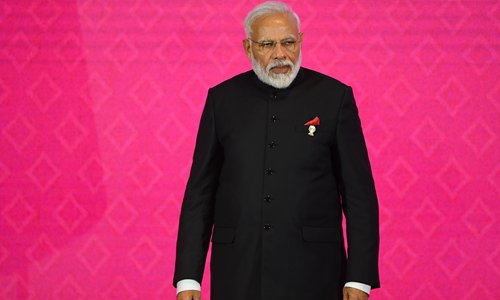HOME >> BUSINESS
India can be major power by joining RCEP... or not
By Hu Weijia Source:Global Times Published: 2019/11/5 23:28:40

Photo: AFP
The countries involved in the Regional Comprehensive Economic Partnership (RCEP) shouldn't lose the chance to include India. For the participants in the negotiations, it is worth thinking about how to persuade India to reconsider the trade deal. To achieve its superpower dream, India should join RCEP.
On Monday, China and 14 partners in the Asia-Pacific region concluded years of negotiations for the RCEP, although India has not yet made a final decision. The trade deal is now at a critical moment to win back India's support.
India's consumption spree makes the country a key participant in the RCEP. Indian news agency PTI reported in January that the country is poised to become the third-largest consumer market behind only the US and China, citing a World Economic Forum report.
A big consumer market and India's dream to become a major power are the reasons that other countries would love to have India on board.
In the era of global interdependence, one can't be a major power by isolating oneself from the global market. If India ducks out of the world's largest trade deal, the nation will miss the opportunity to make its superpower dream a reality.
India is afraid that joining the RCEP will affect its manufacturing industry. This is India's core concern, and it needs to be taken seriously.
That doesn't mean big compromises should be made by the 15 partners at all costs. Any progress must be made based on mutually beneficial cooperation.
But the door is still open for India. One option is to give India an adaptive phase as a buffer, during which India can meet its commitments under the RCEP deal step by step. Another option is to enable the negotiations to continue after the draft signing next year among the 15 other countries. Participants in the negotiations can continue discussing issues such as investment facilitation.
Abandoning the RCEP is not a bold and historic decision, but a historic blunder for India's economy.
For India, a decision to not join the RCEP will protect backward industries, instead of advancing productivity. If protectionism could get the poor out of poverty, there would be no poor countries. The best way to solve unfair trade is to improve competitiveness, rather than to pursue protectionism. Domestic economic problems can only be solved through domestic reforms.
A country doesn't need courage to close its doors to the outside world; it needs courage to open them. However, faced with fierce market-oriented competition, India seems to be choosing the easy option of closing its doors.
The RCEP still has a chance to be promoted among 16 countries. Participants in the negotiations need to exert every effort to keep India in the negotiations, but not at the expense of one-sided compromise.
The author is a reporter with the Global Times. bizopinion@globaltimes.com.cn
Posted in: EYE ON ECONOMY